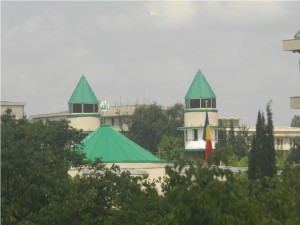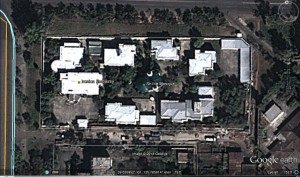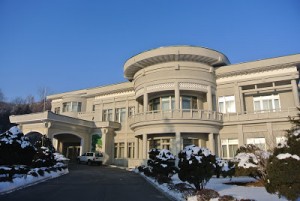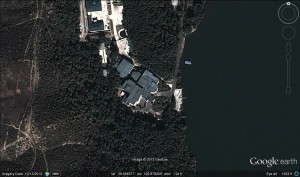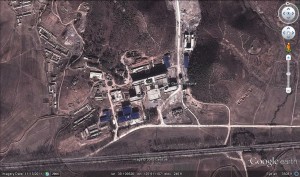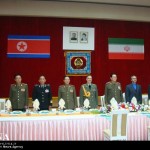UPDATE 2 (2011-6-19): According to Yonhap, a researcher at the Congressional Research Service (CRS) asserts the goal of Executive Order 13466 is to essentially facilitate ratification of the KORUS FTA by preventing the importation of goods made in the Kaesong Industrial Zone into the United States:
A recent executive order issued by U.S. President Barack Obama is partly aimed at banning the imports of products made at an inter-Korean industrial park in Kaesong, a North Korean border town, ahead of the ratification of a free trade pact with South Korea, a Congress-affiliated researcher said Wednesday.
Dick Nanto, a specialist in industry, trade and foreign affairs with the Congressional Research Service (CRS), noted that the April executive order prohibits the direct and indirect entry of North Korean goods.
“The Treasury Department’s Office of Foreign Assets and Control said goods, services and technologies from North Korea may not be imported into the United States directly or indirectly without license,” he said at a forum hosted by Korea Economic Institute.
He said the wording “indirect” was inserted in consideration of Congress’s objection to the inclusion of Kaesong products in the South Korea-U.S. free trade agreement, or KORUS FTA.
“That includes any country — China, South Korea — any country that uses a product of North Korea in the process or as part of the process,” Nanto said.
UPDATE 1 (2011-4-19): Haggard and Noland have a good discussion on the EO.
ORIGINAL POST (2011-4-19): First of all, here is the Executive Order:
Executive Order — Prohibiting Certain Transactions with Respect to North Korea
By the authority vested in me as President by the Constitution and the laws of the United States of America, including the International Emergency Economic Powers Act (50 U.S.C. 1701 et seq.) (IEEPA), the National Emergencies Act (50 U.S.C. 1601 et seq.), section 5 of the United Nations Participation Act of 1945 (22 U.S.C. 287c) (UNPA), and section 301 of title 3, United States Code, and in view of United Nations Security Council Resolution (UNSCR) 1718 of October 14, 2006, and UNSCR 1874 of June 12, 2009,
I, BARACK OBAMA, President of the United States of America, in order to take additional steps to address the national emergency declared in Executive Order 13466 of June 26, 2008, and expanded in Executive Order 13551 of August 30, 2010, that will ensure implementation of the import restrictions contained in UNSCRs 1718 and 1874 and complement the import restrictions provided for in the Arms Export Control Act (22 U.S.C. 2751
et seq.), hereby order:
Section 1. Except to the extent provided in statutes or in licenses, regulations, orders, or directives that may be issued pursuant to this order, and notwithstanding any contract entered into or any license or permit granted prior to the date of
this order, the importation into the United States, directly or indirectly, of any goods, services, or technology from North Korea is prohibited.
Sec. 2. (a) Any transaction by a United States person or within the United States that evades or avoids, has the purpose of evading or avoiding, causes a violation of, or attempts to violate any of the prohibitions set forth in this order is prohibited.
(b) Any conspiracy formed to violate any of the prohibitions set forth in this order is prohibited.
Sec. 3. The provisions of Executive Orders 13466 and 13551 remain in effect, and this order does not affect any action taken pursuant to those orders.
Sec. 4. For the purposes of this order:
(a) the term “person” means an individual or entity;
(b) the term “entity” means a partnership, association, trust, joint venture, corporation, group, subgroup, or other organization;
(c) the term “United States person” means any United States citizen, permanent resident alien, entity organized under the laws of the United States or any jurisdiction within the United States (including foreign branches), or any person in the United States;
(d) the term “North Korea” includes the territory of the Democratic People’s Republic of Korea and the Government of North Korea; and
(e) the term “Government of North Korea” means the Government of the Democratic People’s Republic of Korea, its agencies, instrumentalities, and controlled entities.
Sec. 5. The Secretary of the Treasury, in consultation with the Secretary of State, is hereby authorized to take such actions, including the promulgation of rules and regulations, and to employ all powers granted to the President by IEEPA and the UNPA as may be necessary to carry out the purposes of this order. The Secretary of the Treasury may redelegate any of these functions to other officers and agencies of the United States Government consistent with applicable law. All agencies of the United States Government are hereby directed to take all appropriate measures within their authority to carry out the provisions of this order.
Sec. 6. This order is not intended to, and does not, create any right or benefit, substantive or procedural, enforceable at law or in equity by any party against the United States, its departments, agencies, or entities, its officers, employees, or agents, or any other person.
Sec. 7. This order is effective at 12:01 a.m. eastern daylight time on April 19, 2011.
Here is the text of the letter to Congress:
TEXT OF A LETTER FROM THE PRESIDENT TO THE SPEAKER OF THE HOUSE OF REPRESENTATIVES AND THE PRESIDENT OF THE SENATE
April 18, 2011
Dear Mr. Speaker: (Dear Mr. President:)
Pursuant to the International Emergency Economic Powers Act (50 U.S.C. 1701 et seq.) (IEEPA), I hereby report that I have issued an Executive Order (the “order”) that takes additional steps to address the national emergency declared in Executive Order 13466 of June 26, 2008, and expanded in Executive Order 13551 of August 30, 2010.
In 2008, upon terminating the exercise of certain authorities under the Trading With the Enemy Act (TWEA) with respect to North Korea, the President issued Executive Order 13466 and declared a national emergency pursuant to IEEPA to deal with the unusual and extraordinary threat to the national security and foreign policy of the United States posed by the existence and risk of the proliferation of weapons-usable fissile material on the Korean Peninsula. Executive Order 13466 continued certain restrictions on North Korea and North Korean nationals that had been in place under TWEA.
In 2010, I determined that the Government of North Korea’s continued provocative actions destabilized the Korean Peninsula and imperiled U.S. Armed Forces, allies, and trading partners in the region, and warranted the imposition of additional sanctions, and I issued Executive Order 13551, expanding the national emergency declared in Executive Order 13466. In Executive Order 13551, I ordered blocked the property and interests in property of three North Korean entities and one individual listed in the Annex to that order and provided criteria under which the Secretary of the Treasury, in consultation with the Secretary of State, may designate additional persons whose property and interests in property shall be blocked.
The United Nations Security Council, in Resolutions 1718 and 1874, requires Member States to take certain measures to prevent, among other transactions, the importation of certain goods and services from North Korea. The sanctions contained in Executive Order 13551 strengthen the implementation of these Resolutions.
I have issued the order today to further address the national emergency with respect to North Korea and ensure implementation of United Nations Security Council Resolutions 1718 and 1874. The order also complements executive authorities under section 73 of the Arms Export Control Act to ensure that all imports from North Korea are consistent with the import restrictions described in that provision, even when relevant designations under that provision are not in effect. To accomplish these goals, the order prohibits the direct or indirect importation of goods, services, and technology from North Korea. Unless exempt, all imports into the United States from North Korea must be authorized.
The order leaves in place all existing sanctions imposed under Executive Orders 13466 and 13551.
I have delegated to the Secretary of the Treasury the authority, in consultation with the Secretary of State, to take such actions, including the promulgation of rules and regulations, and to employ all powers granted to the President by IEEPA and the United Nations Participation Act as may be necessary to carry out the purposes of the order. In particular, this delegated authority may be used to establish a process to consider licenses for imports from North Korea that are consistent with the purposes of the order.
The order is effective at 12:01 a.m. eastern daylight time on April 19, 2011. All executive agencies of the United States Government are directed to take all appropriate measures within their authority to carry out the provisions of the order.
I am enclosing a copy of the order I have issued.
Sincerely,
BARACK OBAMA
According to the Wall Street Journal:
Monday’s order further expands on an executive order imposed in August 2010 (pdf), and another in 2008. Both remain in effect under this order. In a letter to the House Speaker and the president of the Senate, Obama said the order prohibits the direct importation of goods, services or technology from North Korea.
“Unless exempt, all imports into the United States from North Korea must be authorized,” the letter says.
The goal of the latest executive order is to further implement two United Nations Security Council resolutions, 1718 and 1874, which tasked member states to prevent certain transactions and imports from North Korea. The latest issuance sends a signal that the prior orders weren’t enough, however.
Treasury is tasked with coming up with rules on how to enforce the sanctions and issue import licenses under the order. It went into effect at midnight Tuesday.
The US Treasury also blacklisted another North Korean bank. According to Reuters:
The U.S. Treasury on Tuesday imposed sanctions on North Korea’s Bank of East Land over transactions with a blacklisted North Korean arms maker that it said has exported torpedoes to Iran.
The Treasury said the action was taken under an August 2010 White House executive order that aims to thwart North Korea’s arms trade, luxury goods imports, narcotics trafficking and money laundering.
The move seeks to freeze any Bank of East Land assets that may be under U.S. jurisdiction and bans U.S. entities from transactions with the institution, also known as Dongbang Bank.
The Treasury has fought a long-running sanctions battle against illicit activities of the North Korean government, including its alleged manufacturing of high-quality counterfeit $100 bills known as “supernotes.”
“Bank of East Land is a major conduit for facilitating North Korea’s conventional arms trade,” David Cohen, the Treasury’s acting under secretary for terrorism and financial intelligence, said in a statement.
“Today’s designation exposes North Korea’s efforts to circumvent sanctions to conduct illegal activities and degrades its ability to abuse the international financial system,” Cohen said.
The Treasury said Bank of East Land has facilitated transactions for Green Pine Associated Corp, a North Korean arms manufacturer and exporter that was previously placed on the U.S. sanctions list. It said Green Pine produces submarines, military boats and missile systems and has exported torpedoes and technical assistance to Iranian defense-related firms.
In 2007 and 2008, the bank also facilitated transactions involving Green Pine and two blacklisted Iranian financial institutions, Bank Melli and Bank Sepah, the Treasury said. The Iranian state banks previously were sanctioned under an executive order aimed at curbing Iran’s nuclear and missile development efforts.
In 2005, the Treasury blacklisted a small bank in Macau, Banco Delta Asia, which cut off Pyongyang’s primary conduit to the international financial system at that time. The move was separate from sanctions aimed at curbing North Korea’s nuclear program but added pressure on the reclusive communist regime to bring it back to multilateral nuclear talks.
Here is the US Treasury Department’s North Korea sanctions page.

